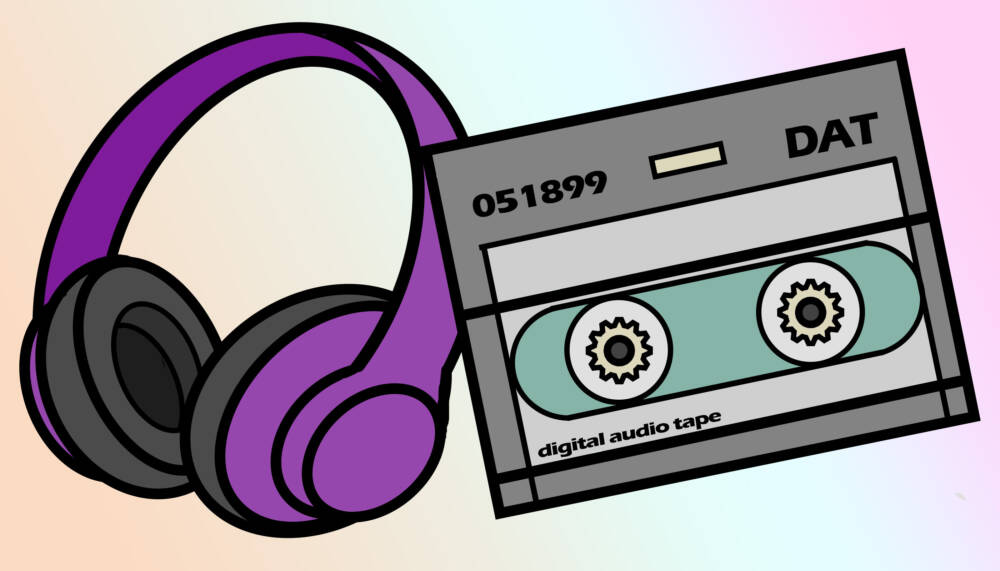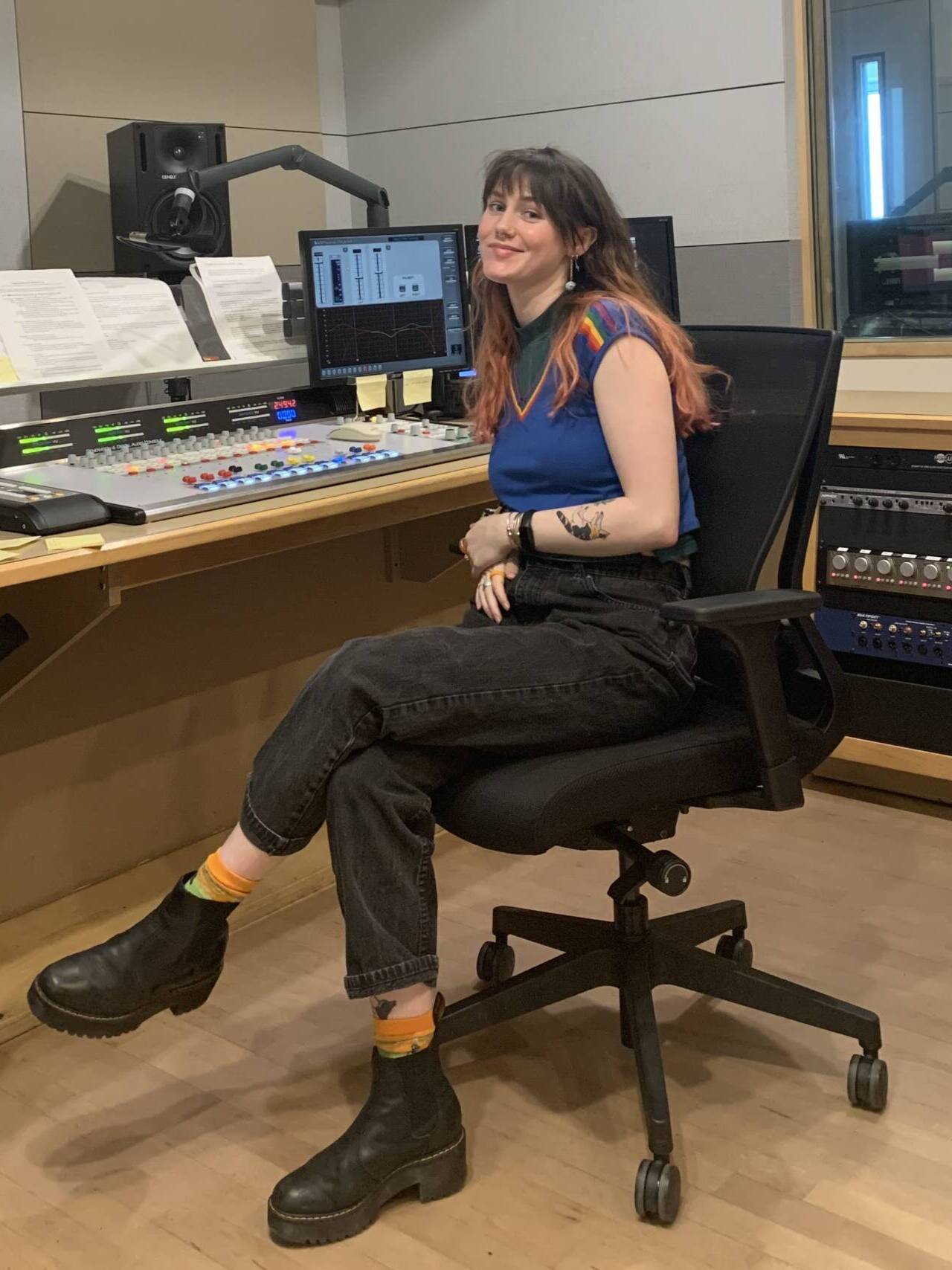Advertisement
I listened to the Here & Now broadcast from the day I was born. Here’s what I found

On a recent stroll around the WBUR offices, a colleague and I stumbled on an archive of Here & Now broadcasts from the late 1990s. I immediately located the tape for May 18, 1999.
A Tuesday, 65 degrees and sunny in Boston, the day means nothing to most people. But it’s the day I was born, and as a self-proclaimed “birthday person,” it means something to me.
As I celebrate my 24th birthday, I decided to listen back to the broadcast from that day — with help from the station’s revered engineers who helped me find a way to listen to it.
Here & Now launched in 1998 as a regional broadcast focusing on New England. In 2013, NPR picked up Here & Now for national distribution, and the show expanded to a two-hour broadcast.
Aside from the shorter, one-hour length of the broadcast, the similarities between the 1999 broadcast and the ones I hear on the air now stunned me. From the newsy headline reads at the top of the hour to the rapport between the guests and hosts — Bruce Gellerman and Liz Bulkley on this particular day — it all felt pretty familiar.

And so did many of the topics. The broadcast started by discussing a bill in the Massachusetts House to approve funding for Gillette Stadium in hopes of keeping the New England Patriots in Foxboro, Massachusetts. I grew up in the town of Franklin, about 20 minutes away from Gillette. I frequented the shops and restaurants there throughout middle and high school, 10 years after the stadium opened in 2002. Though I’m not a football fan, Gillette was a hot spot for tween socialization, and I’ve returned to the Olive Garden there a few times since with my family.
A few of the headlines hit close to home in a more somber way: On the day I was born, the Defense of Marriage Act was given a hearing in the Massachusetts legislature. It would define marriage as a union between a man and a woman.
Elsewhere in the show, we hear that state lawmakers are also considering a ban on what was then called "partial-birth abortion," a term no longer used in most reporting because it carries ideological baggage and is not a medical term.
Advertisement
The ban didn't pass. Five years later, Massachusetts legalized same-sex marriage, 11 years before the Supreme Court guaranteed the right federally. In a historically progressive state like Massachusetts, I thought that both the issues of abortion rights and marriage equality were settled already.
However, when the Supreme Court overturned the federal right to abortion last year, Justice Clarence Thomas indicated that he would be open to revisiting the case that legalized same-sex marriage as well. Meanwhile, more than 100 anti-trans bills have been introduced in states across the country since 2020. As a journalist, it’s eye-opening to see these debates repeated over and over again. But as a queer person, it’s disheartening and frightening when rights are rolled back after years of seemingly being guaranteed.
A Massachusetts 10th grader protesting the Massachusetts Comprehensive Assessment System, or MCAS, made an appearance later in the show. MCAS is a standardized test given to Massachusetts students from grades 3 to 10 — I took it every year. It’s required that 10th-grade students pass the MCAS to earn a high school diploma.
Students say there was too much pressure for educators to teach to the test, and wanted to, as student Julia Clayman told Here & Now, "take back the time wasted on the MCAS test that could have been spent in classrooms."
This story of student protest stood out to me. When young people today push back against things they don’t agree with — like gun violence, bans on gender-affirming care, tax breaks for the rich — some members of older generations are quick to call out Gen Z as overly sensitive, uninformed and unaware of “the real world.”
Willingness to question the status quo isn’t a characteristic of Gen Z; it’s present in all young generations. What one generation labels ‘sensitivity’ another sees as empathy, and ‘uninformed’ or ‘unaware’ could describe someone who is idealistic. This generation won’t be the last to push the boundaries of what is socially or politically acceptable.
A recurring Tuesday tech segment followed in the show. This installment featured an interview with a University of Massachusetts Lowell student who created a webpage that effectively sidestepped website-blocking software installed by school administrators. The student described his disdain for censorship. He said he created the site so people could do innocuous tasks like check their email or keep up with sports scores since many schools blocked both Hotmail and ESPN.
I’m young enough that the internet pervaded and shaped my youth. From the time I was in elementary school, my family had a ‘computer room’ in our house where my brother and I spent hours absorbed in games like “Zoombinis” and the original “Sims,” not to mention the dozens of masterpieces conceived on Microsoft Paint. By the time I was 13, I already had accounts on Skype, Instagram and Twitter, and had discovered the phenomenon of online chatrooms.
Though I’m no tech genius, it astounded me how innocent the internet sounded at the time I was born. Even when Gellerman tried to posit a hypothetical where someone used the student’s software with malicious intent, the only example he cited was viewing nude photos. While I’m sure there was a nefarious side to the internet from its inception, recent years have shown just how easily sinister content bleeds into the mainstream.
Censorship is still at the forefront of many discussions around online regulation, including Senate hearings about artificial intelligence technology. When Elon Musk took over as Twitter’s CEO, content moderation changes on the platform ensued. Musk’s Twitter reinstated accounts that had been banned for purporting harmful content. The platform also removed its ban on misgendering and deadnaming transgender people, and has been accused of removing screenshots of MMA fighter Jake Shields calling for the execution of transgender people.
It’s no longer a college student with a computer and a dream controlling what content can be accessed. It’s massive, privately-owned media corporations deciding what can and cannot be posted on their slices of the internet.
Another segment of the broadcast focused on research into a breakthrough cancer drug, spearheaded by Dr. Judah Folkman, who had a profound impact on cancer research and is still credited in modern-day research, even after his death in 2008.
The show also included a report of Harvard University returning a large collection of human remains and other cultural artifacts to Indigenous people in New Mexico. Harvard has a long history of repatriation efforts, some followed through on and some still hanging in the balance. A lot of institutions are still in the early stages of repatriation today, and land acknowledgments in the U.S. are still few and far between.
This particular show ended with a live, in-studio performance by Mark Erelli, a Massachusetts-based folk musician who credits the Allman Brothers Band and Bob Dylan as major inspirations. Since 1999, Erelli has released more than 10 studio albums.
After listening to the broadcast and mulling it over for a bit, I’ve realized how cyclical social and political movements and the news that surrounds them can be; I wouldn’t be shocked to hear a show today that touches on abortion rights, student protests and internet regulations. Whether positive or negative, history does repeat itself, and getting a peek into a piece of Here & Now’s history confirmed that to me.
Oh, and my other takeaway? More in-studio performances! There’s nothing like hearing the strum of a guitar or the honk of a harmonica over public radio airwaves.
